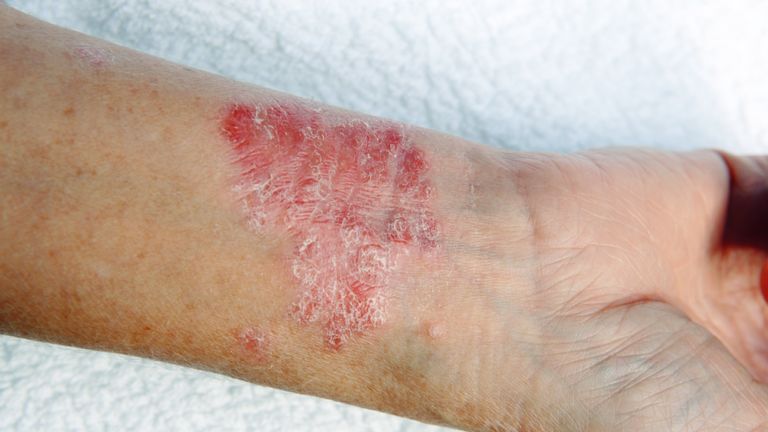More than 50 people have died or been seriously injured over the last 10 years after their emollient cream dried on fabric and caught fire, health and fire chiefs have warned.
The Medicines and Healthcare products Regulatory Agency (MHRA) has partnered with the National Fire Chiefs Council, Fire and Rescue services and health charities to warn people who use the creams to be careful, after they were linked to fire-related deaths.
Emollients are often used by people with eczema and other skin conditions, and are usually applied directly to the skin to help cool and sooth the affected area.

Image:The creams are usually used by those with skin conditions, such as psoriasis
The campaign by the various organisations is aiming to show how some of the products can create a very flammable combination when dried on to fabric - leading to serious injury and death.
The creams can easily be transferred from the skin to bedding or clothing, which is left to build up, and once it comes into contact with a naked flame, is highly flammable.
It can even stay on fabrics despite them being washed, officials say.
However, the risk can be minimised by removing long-sleeved and loose clothing before cooking, or by using a safety lighter.
Since 2010, more than 50 deaths and serious injuries have been linked to the dried-in creams, according to the MHRA, with a review showing that over-60s, smokers and those with reduced mobility are the most at risk groups.
Those who use the creams and are in those groups are being urged to get a fire service risk assessment of their homes, and to be careful around naked flames.
**:: Listen to the Daily podcast on **
Apple Podcasts
**, Google Podcasts
, Spotify
, Spreaker
**
"We want to ensure that those who are at greatest risk, and their carers, understand the fire risk associated with the build-up of residue on clothing and bedding and take action to minimise the risk," said Sarah Branch, director of MHRA's Vigilance and Risk Management of Medicines Division.
"Anyone who uses emollients and has any questions or concerns should speak to a healthcare professional, such as your pharmacist or GP."
Rick Hylton, lead of the National Fire Chiefs Council Home Safety Committee, added: "We now know that all emollients, combined with factors such as smoking or mobility issues, pose potential fire risks and this applies to both paraffin and paraffin-free products. Washing fabrics does not fully remove this risk.
"This doesn't mean people shouldn't use these products, but we urge people to follow the updated fire safety advice.
"If you use these products and smoke, don't do so when wearing clothes or bandages that may have dried-on emollients.
"Don't smoke in bed as bedding may have residue on it and be careful around other heat sources such as gas, halogen or open fires and when cooking."
 简体中文
简体中文










